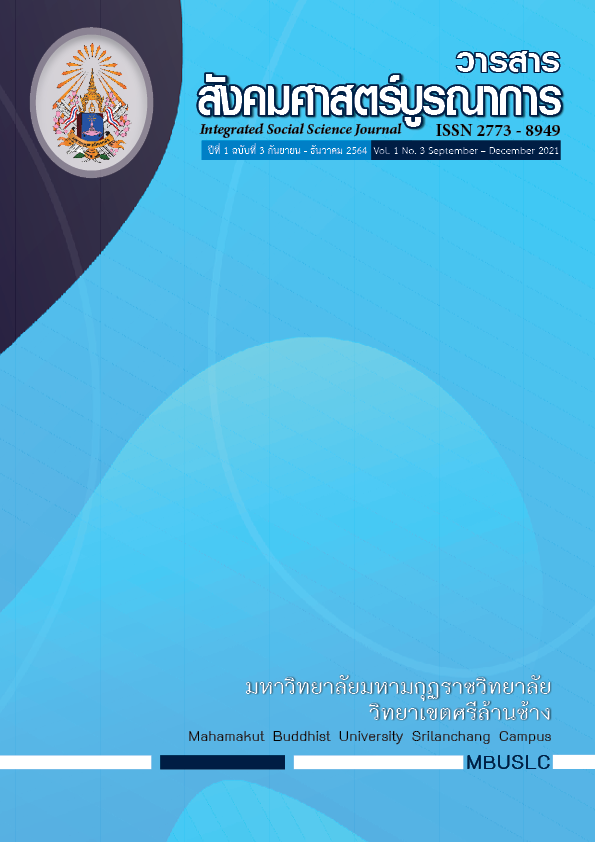HOW TO LIVE HAPPY IN THE DIGITAL AGE
Main Article Content
Abstract
In the digital era, people in many parts of the world had used the internet, online media, and social networking sites to publicize news and information for business, education, and work. This was especially undeniable in situations where the COVID-19 pandemic had occurred making many various systems disrupted, and people had to work from their accommodations. In the educational institutions, the procedure of teaching and learning had been converted from the actual classroom (On-site) to online learning (Online). A number of people were turning to the internet to study and work. Social gatherings and meetings had decreased, on the other hand online meetings had increased. This changed the way people lived. Social media addiction occurred and suffered people as a result of how they are not able to live their real life and further frustrate with the world of internet. In the study, sufficiency economy was presented as the possible solution to solve the matter in which will be achieved by applying 3 Buddhist principles. There were three simple components of the sufficiency economy as follows: 1) Modesty, 2) Being Reasonable, 3) To have the immunity, whereas these three components could benefit people to a happy end in the digital age. Thus, many people spent a lot of time working or using electronic media for a long time, and if the user lacked of moral and ethical practice, it would cause problems for self, society and country.
Article Details

This work is licensed under a Creative Commons Attribution-NonCommercial-NoDerivatives 4.0 International License.
บทความที่ได้รับการพิจารณาจากคณะกรรมการผู้ทรงคุณวุฒิและเผยแผ่ในวารสารฉบับนี้ เป็นทัศนคติและข้อคิดเห็นส่วนบุคคลของผู้เขียนแต่ละท่าน ไม่ถือว่าเป็นทัศนะคติและความรับผิดชอบ
ของบรรณาธิการ
บทความ ข้อมูล เนื้อหา รูปภาพ ฯลฯ ที่ได้รับการตีพิมพ์ในวารสารสังคมศาสตร์บูรณาการ ถือเป็นลิขสิทธิ์ของวารสารสังคมศาสตร์บูรณาการ หากบุคคลหรือหน่วยงานใดต้องการนำทั้งหมดหรือส่วนหนึ่งส่วนใดไปเผยแพร่ต่อหรือเพื่อกระทำการใด ๆ จะต้องได้รับอนุญาตเป็นลายลักอักษรจากวารสารสังคมศาสตร์บูรณาการ ก่อนเท่านั้น
References
คัคนางค์ มณีศรี และ วัชราภรณ์ บุญญศิริวัฒน์. (2563). สารคดีทางวิทยุรายการจิตวิทยาเพื่อคุณ. วิทยุจุฬาฯ FM 101.5 MHz. คณะจิตวิทยา จุฬาลงกรณ์มหาวิทยาลัย. ออนไลน์. สืบค้นเมื่อ 12 มีนาคม 2564.
ณัชร สยามวาลา และวรประภา นาควัชระ. (2561). เศรษฐกิจดิจิทัลแบบพอเพียง.ยิ่งให้ยิ่งสุข ยิ่งให้ยิ่งสุข. สำนักพิมพ์อมรินทร์ธรรมะ.
สำนักงานปลัดกระทรวงการอุดมศึกษา วิทยาศาสตร์ วิจัยและนวัตกรรม. (2564). แผนปฏิบัติการดิจิทัลกระทรวงวิทยาศาสตร์และเทคโนโลยี (วท.) ประจำปีงบประมาณ พ.ศ. 2560 - 2564. ศูนย์เทคโนโลยีสารสนเทศและการสื่อสาร สำนักงานปลัดกระทรวงการอุดมศึกษา วิทยาศาสตร์ วิจัยและนวัตกรรม.ออนไลน์. สืบค้นข้อมูล 10 มีนาคม 2564.
สำนักงานเลขาธิการวุฒิสภา. (2563). ทักษะการทำงานในโลกยุคดิจิทัล. สำนักวิชาการ สำนักงานเลขาธิการวุฒิสภา. 10(4)
เสาวลักษณ์ พันธบุตร. (2562). การศึกษาแนวคิดและรูปแบบในการสร้างสติกเกอร์คาแร็กเตอร์เพื่อใช้ในสื่อ สังคมออนไลน์. วารสารวิชาการนวัตกรรมสื่อสารสังคม.7(1) มกราคม - มิถุนายน 2562, หน้า 156 – 167.

